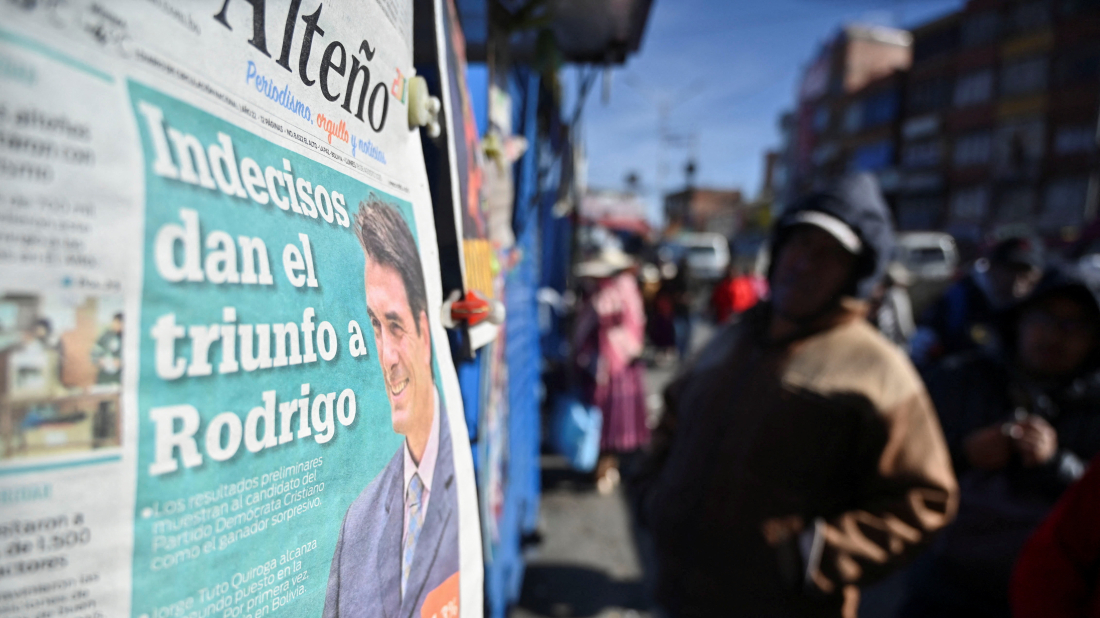Kazakhstan vows to fast-track AZAL crash investigation amid rising diplomatic tensions
Kazakhstan has vowed to speed up its investigation into the Azerbaijan Airlines (AZAL) crash near Aktau, as mounti...

In Bolivia's first-round presidential election, voters decisively rejected the leftist party that has ruled the country for most of the past two decades, signalling a shift toward more market-friendly policies to address the nation's economic struggles.
Centrist senator Rodrigo Paz led with 32.18% of the vote, while conservative former president Jorge "Tuto" Quiroga trailed at 26.94%.
With no candidate achieving over 40% of the vote and no 10-point lead, a runoff election is set for 19 October. The results reflect a shift in Bolivia’s political landscape, previously dominated by the leftist MAS party, led by Evo Morales, whose influence has waned in recent years.
Paz, in his victory speech, emphasised the need for a change not just in government but in the political system itself. Investors reacted positively to the results, with Bolivia’s bonds seeing a significant rise, reflecting hopes for economic recovery and potential aid from the IMF.
Bolivia’s economic challenges, including rising inflation, fuel shortages, and a lack of dollars, were top concerns for voters. The country’s fragile economy, with inflation reaching 23% by June, had led many Bolivians to turn to alternative methods like cryptocurrencies to protect their savings.
The election results also signal a potential shift in Latin America, with upcoming elections in Chile and Colombia possibly following Bolivia’s lead toward rightward political shifts. Voter turnout was steady, despite concerns of possible disruptions, with null and blank ballots making up 21.5% of the vote, indicating some lingering support for Morales.
In the aftermath, Paz and Quiroga will face off in the upcoming runoff, while several minor incidents were reported at polling stations, particularly in Morales' stronghold of Cochabamba. Both Paz and Quiroga promised significant reforms to tackle Bolivia’s economic crisis.
The Kremlin is utilising the recent United States and Israeli military strikes on Iran to validate its ongoing war in Ukraine. Russian officials are pointing to the escalation in the Middle East as evidence that Western nations do not adhere to international rules.
Saudi Arabia’s state oil giant Saudi Aramco closed its Ras Tanura refinery on Monday following an Iranian drone strike, an industry source told Reuters as Tehran retaliated across the Gulf after a U.S.-Israeli attack on Iranian targets over the weekend.
The Middle East crisis intensifies after the deadly attack on the compound of the Supreme Leader of Iran Ali Khamenei on Saturday that killed him, other family members and senior figures. Iran has launched retaliatory strikes on U.S. targets in the region.
U.S. President Donald Trump said the U.S. military has enough stockpiled weapons to fight wars "forever"; in a social media post late on Monday. The remarks came hours before conflict in Iran and the Middle East entered its fourth day.
Türkiye raised its security level for Turkish-flagged vessels in the Strait of Hormuz to Level 3 on Sunday (2 March). The development follows Iranian restrictions on shipping after U.S. and Israeli strikes and confirmation of Supreme Leader Ali Khamenei’s death.
Strikes across the Middle East are intensifying, fuelling travel disruption, driving up global energy prices and forcing diplomatic missions to shut their doors as tensions continue to rise.
U.S. President Donald Trump has said the United States has a “virtually unlimited supply” of munitions and is capable of sustaining military action indefinitely, as the conflict with Iran entered its fourth day.
The United Nations has called for an investigation into a deadly attack on a girls’ primary school in Iran, which Iranian officials say has killed more than 100 children. The U.S. has said its forces “would not” deliberately target a school.
U.S. first lady, Melania Trump chaired a UN Security Council meeting on children and education in conflict on Monday (2 March), a move criticised by Iran as hypocritical following U.S. and Israeli strikes that triggered a UN warning about risks to children.
Start your day informed with AnewZ Morning Brief. Here are the top news stories for the 3rd of February, covering the latest developments you need to know.
You can download the AnewZ application from Play Store and the App Store.

What is your opinion on this topic?
Leave the first comment